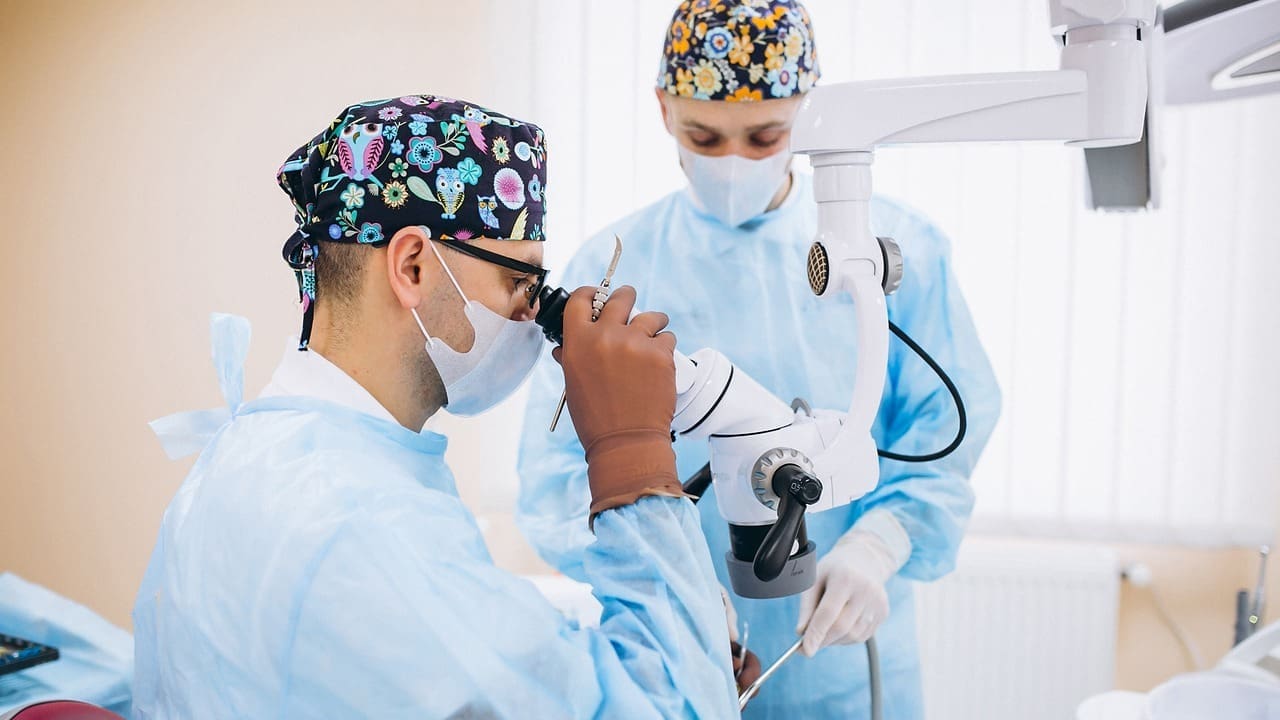
Having acoustic neuroma surgery can feel scary. But knowing what to expect during recovery can make things easier.
At Liv Hospitals, we focus on you, making sure you’re informed and supported. The recovery timeline for vestibular neuroma surgery changes based on your health and the surgery’s complexity.
Usually, you’ll stay in the hospital for 3-5 days. Recovery can take weeks to months. We’ll help you understand what comes next, so you can feel more confident in your recovery.
Key Takeaways
- Understand the recovery timeline after acoustic neuroma surgery
- Know what to expect during your hospital stay
- Learn about the factors influencing your recovery
- Get insights into the overall recovery process
- Discover how Liv Hospitals supports your recovery journey
Understanding Acoustic Neuroma Surgery

Acoustic neuroma, also known as vestibular schwannoma, is a non-cancerous tumor on the vestibular nerve. Surgery is a main treatment option. This condition can greatly affect a patient’s life, so it’s important to know about the surgery.
What is an Acoustic Neuroma?
An acoustic neuroma is a non-cancerous growth on the eighth cranial nerve. This nerve controls balance and hearing. The tumor can cause hearing loss, tinnitus, and balance issues. The exact cause is not known, but genetics play a part, like in neurofibromatosis type 2.
Common Surgical Approaches
There are several surgical methods for acoustic neuroma, each with its own benefits and challenges. The main techniques are:
- Translabyrinthine Craniotomy: This method removes the tumor through the inner ear. It’s often used for bigger tumors or when hearing loss is severe.
- Middle Fossa Craniotomy: This technique accesses the tumor through the middle cranial fossa. It’s for smaller tumors in patients with some hearing left.
- Retrosigmoid Craniotomy: This approach removes the tumor through an opening behind the ear. It aims to save hearing and facial nerve function.
Translabyrinthine Craniotomy vs. Other Techniques
Translabyrinthine craniotomy is a key surgery for acoustic neuroma, mainly for larger tumors. It provides a direct path to the tumor, lowering the risk of damage. Yet, it usually leads to hearing loss on the affected side. Other methods, like middle fossa and retrosigmoid craniotomies, might save more hearing, depending on the tumor’s size and location.
A leading neurosurgeon notes,
“The choice of surgical approach depends on various factors, including the tumor’s size, the patient’s hearing status, and the surgeon’s expertise.”
Knowing these factors is key for patients to make the best treatment choice.
Preparing for Your Acoustic Neuroma Operation

Getting ready for your acoustic neuroma surgery is a big step. It starts with understanding what’s ahead and preparing well. You’ll go through several key steps to make sure you get the best results.
Pre-surgical Evaluations
First, you’ll have to go through detailed pre-surgery checks. These tests are key to knowing your health and any risks the surgery might have.
- Imaging Tests: MRI and CT scans show the tumor’s location and help plan the surgery.
- Hearing Assessments: Audiological tests check your current hearing. This is important for understanding how the surgery might affect you.
- General Health Checks: Your overall health will be checked to lower the risk of complications.
Discussions with Your Surgical Team
Talking openly with your surgical team is key for a good surgery. You’ll get to share your worries, ask questions, and learn about the surgery plan.
Choosing a top best acoustic neuroma surgeon is important. They will explain your case, the surgery plan, and what to expect during recovery.
Setting Realistic Expectations
It’s important to know what to expect from your surgery. Your team will talk about possible outcomes, risks, and how long it might take to recover.
Being well-informed and prepared can help reduce your stress. Remember, your team is there to support you from start to finish.
The Day of Your Acoustic Neuroma Surgery
Getting ready for your acoustic neuroma surgery can make you feel anxious. We’re here to help you through every step. We know surgery is a big deal.
Duration of the Procedure
The duration of acoustic neuroma surgery is usually 5 to 8 hours. This long time is needed to remove the tumor safely. We aim to keep nerves and other important structures intact.
The size and location of your tumor can affect how long the surgery takes. These details are important for us to plan the surgery well.
Anesthesia and Intraoperative Monitoring
We use general anesthesia to keep you comfortable and safe. You’ll be asleep and won’t feel any pain or discomfort during the surgery.
We also use advanced monitoring to watch your facial nerve and other important structures. This helps us make precise decisions during the surgery. It’s a key part of keeping you safe.
Tumor Removal Process
The tumor removal process is the main part of your surgery. Our surgeons work carefully to remove the tumor. They aim to take out as much of the tumor as possible while keeping your nerves working.
| Surgical Step | Description | Importance |
|---|---|---|
| Anesthesia Administration | Patient is put under general anesthesia to ensure comfort and safety. | High |
| Intraoperative Monitoring Setup | Monitoring equipment is set up to track nerve function during surgery. | High |
| Tumor Dissection | Surgeon carefully removes the tumor from surrounding nerves and tissue. | Critical |
Knowing about the steps in your acoustic neuroma removal helps you understand the care we put into your surgery. Our team is dedicated to giving you the best results.
Immediate Post-Operative Period
After acoustic neuroma surgery, patients face a critical recovery phase. This time is filled with physical and emotional hurdles. But, with the right care and support, patients can get through it.
First 24-48 Hours After Surgery
The first 24-48 hours are spent in the ICU or a neurosurgical unit. Medical teams watch vital signs and neurological functions closely. Effective pain management is key to comfort.
Hospital Stay Duration (3-5 Days)
Patients usually stay 3-5 days in the hospital. This lets doctors manage pain and watch for complications. The stay can vary based on health and complications.
Initial Pain Management Protocols
Pain control is a big part of recovery. Our team uses several methods to manage pain, including:
- Intravenous pain medications
- Oral pain relief medications
- Other therapies to ease discomfort
We create a pain plan that fits each patient’s needs. This helps them stay comfortable during recovery.
Knowing what to expect in the first days helps patients prepare for their recovery. It’s a journey filled with challenges and opportunities.
First Week of Recovery at Home
The first week after acoustic neuroma surgery is key. You need to plan carefully and follow your doctor’s instructions. Knowing how to handle challenges at home is important.
Discharge Instructions
When you go home, you’ll get detailed care instructions. These cover managing side effects, what activities to avoid, and how to care for your wound. It’s vital to stick to these to avoid complications.
Managing Initial Side Effects means being ready for dizziness, headaches, and tiredness. Having someone to help with daily tasks is helpful.
Managing Initial Side Effects
In the first week, you might feel dizzy, nauseous, have headaches, or feel very tired. Resting, drinking plenty of water, and taking your medicine as directed can help.
Here’s a table with common side effects and tips to handle them:
| Side Effect | Management Tips |
|---|---|
| Dizziness | Move slowly, take regular breaks, and avoid driving or operating heavy machinery. |
| Nausea | Eat small, frequent meals, avoid strong odors, and consider anti-nausea medication. |
| Headache | Follow the prescribed pain management plan, stay hydrated, and rest in a quiet environment. |
Activity Restrictions and Wound Care
It’s important to follow activity restrictions in the first week. Avoid heavy lifting, bending, or hard work. Proper wound care is also key to avoid infection and help it heal.
Specific wound care instructions will be given by your healthcare team. They’ll tell you how to clean the wound, change dressings, and watch for infection signs.
By following your doctor’s instructions, managing side effects, and taking care of your wound, you can make it through the first week at home.
Weeks 2-4 After Acoustic Neuroma Excision
After acoustic neuroma excision, patients start to feel better slowly. But, some symptoms may stick around. Knowing what to expect helps manage recovery better.
Physical Symptoms to Expect
In weeks 2-4, patients might feel fatigue, headache, and dizziness. Some may notice facial numbness or weakness. Hearing or balance changes are also common. Symptoms vary from person to person.
As healing happens, some symptoms will lessen. Others might stay. Following the best acoustic neuroma surgeons in US advice is key for healing right.
Beginning Basic Activities
Starting simple activities helps in recovery. Begin with gentle exercises and slowly add more. This builds strength and improves health.
Remember to pace activities to avoid too much. Resting when needed is important during this time.
Initial Follow-up Appointments
Follow-up appointments with the surgical team are vital. They check on healing, remove stitches, and address any issues.
Patients should come prepared to their follow-up appointments with questions. This ensures they get the best care during recovery.
Understanding the recovery timeline helps patients navigate weeks 2-4 after acoustic neuroma excision. With the right support, many make a full recovery.
Months 1-3 of Recovery Timeline
The first three months after acoustic neuroma surgery are key for healing. It’s a time to make progress and prepare for a full recovery.
Returning to Work
Most people go back to work in 6-12 weeks. The exact time depends on health, job type, and recovery speed. Always listen to your surgeon about when to start work again. Going back too early can cause problems or slow healing.
Gradual Increase in Activities
In the first three months, increase physical activities slowly. This helps your body heal and avoids complications. Start with short walks and light stretching, then increase intensity and time.
- Start with low-impact activities like walking or yoga.
- Gradually introduce more strenuous exercises as your body allows.
- Avoid heavy lifting, bending, or activities that strain your surgical site.
Ongoing Symptom Management
Managing symptoms well is key during recovery. You might feel dizzy, have hearing changes, or numbness. Work closely with your healthcare team to manage symptoms. They might use medication, physical therapy, or other treatments based on your needs.
As one patient shared, “The first three months were tough, but with the right support, I managed my symptoms and recovered well.”
Knowing what to expect in the first three months helps patients navigate this important time. It sets them up for long-term success.
Long-term Recovery from Acoustic Neuroma Surgery
Recovering from acoustic neuroma surgery is a long journey. It involves both physical healing and getting used to new feelings. We help patients understand what to expect from 6-12 months after surgery. We also talk about the changes that might last forever and how to adjust to a new life.
Progress from 6-12 Months
From 6 to 12 months after surgery, patients see big improvements. They feel less tired, dizzy, and have fewer headaches. This lets them slowly get back to their usual activities.
“The first year after surgery is key for recovery,” says a top neurosurgeon. “Patients need to be patient and keep going as their body heals.” This shows how important it is to be supportive during this time.
Permanent vs. Temporary Changes
Understanding the difference between permanent and temporary changes is vital. Some effects of surgery might go away, but others will stay. For example, hearing loss on one side is often permanent. We help patients adjust to these changes and find ways to deal with them.
- Temporary changes, like facial weakness or taste issues, usually get better over time.
- Permanent changes, like hearing loss, mean patients need to find new ways to cope.
Adjusting to Your New Normal
Life after surgery is not just about getting better physically. It’s also about adjusting emotionally and mentally. We encourage patients to accept their new life by focusing on what they can control. This might mean learning new ways to communicate or finding new hobbies.
Every person’s recovery is different. We are here to support our patients every step of the way. By knowing what to expect, patients can better handle their recovery and reach their best outcomes.
Managing Common Complications After Vestibular Neuroma Surgery
Managing complications after vestibular neuroma surgery is key for a good recovery. The surgery is usually safe, but patients might face various issues that need careful handling and rehab.
Hearing Changes and Adaptations
Hearing changes are a possible side effect of the surgery. Patients might lose hearing or get tinnitus (ringing in the ears). Talking to your surgical team before the surgery is vital to know what to expect and how to deal with these symptoms.
Adapting to hearing changes includes:
- Using hearing aids or other assistive listening devices
- Practicing lip-reading or sign language
- Participating in auditory rehabilitation programs
One patient said, “After my surgery, I lost a lot of hearing, but with my audiologist’s help, I adapted using hearing aids and got better at talking.” This shows how important a supportive care team is in handling post-operative issues.
| Hearing Adaptation Strategy | Description | Benefit |
|---|---|---|
| Hearing Aids | Amplify sound to improve hearing | Enhanced communication |
| Auditory Rehabilitation | Programs to improve listening and communication skills | Better adaptation to hearing loss |
| Lip-reading | Technique to understand speech by observing lip movements | Improved understanding in noisy environments |
Facial Nerve Weakness Management
Facial nerve weakness is another possible issue after the surgery. The facial nerve is delicate and can get affected, leading to weakness or paralysis. Early help from a physical therapist or a facial rehabilitation specialist can greatly help.
Management strategies include:
- Facial exercises to strengthen the muscles
- Eye care to prevent dryness and injury
- Potential surgical interventions for persistent weakness
“Rehabilitation after vestibular neuroma surgery is not just about recovering from the operation; it’s about regaining your quality of life.”
Balance and Coordination Issues
Balance and coordination problems are common after the surgery. This is because the tumor removal affects the vestibular system. Vestibular rehabilitation therapy (VRT) is key in managing these issues.
VRT involves:
- Customized exercises to improve balance and reduce dizziness
- Strategies to adapt to the loss of vestibular function
- Gradual return to normal activities
By understanding and managing these common complications, patients can greatly improve their recovery and quality of life after vestibular neuroma surgery.
Acoustic Neuroma Surgery Scar Healing and Care
Understanding how to care for your scar after acoustic neuroma surgery is key. The scar comes from the incision made to reach the tumor. Its look can change based on the surgery method.
Typical Scar Locations and Appearance
The scar’s spot and look depend on the surgery type. For example, a retrosigmoid approach leads to a scar behind the ear. A translabyrinthine approach also results in a similar scar spot. At first, the scar might look like a thin line, be slightly raised, or red.
Scar Management Techniques
Good scar care is vital for healing and making the scar less noticeable. Here are some tips:
- Keep the scar clean and dry to avoid infection.
- Massage the scar gently with a cream or oil to help it heal and reduce sticking.
- Apply silicone gel or sheeting to flatten and soften the scar.
- Shield the scar from the sun with sunscreen or clothes.
Timeline for Scar Maturation
Scar maturation can take a year or more. At first, the scar might look red, raised, or firm. But, it will get flatter, softer, and blend in with your skin over time. Being patient and sticking to scar care is important for the best results.
By knowing how scars heal and using the right care, patients can improve their recovery. This helps make the scar from acoustic neuroma surgery less noticeable.
Finding the Best Acoustic Neuroma Surgeons
Finding the right acoustic neuroma surgeon is a big step. You need to look for someone with the right skills and experience. This is key for your care.
Expertise and Qualities to Look For
The top acoustic neuroma surgeons have certain qualities. Experience is key; they should have done many of these surgeries. Board certification in neurosurgery or otolaryngology is also important. It shows they meet high standards.
Good communication is also important. A great surgeon will explain everything clearly. This makes you feel at ease and informed.
Multidisciplinary Care Approaches
Getting care from a team is best. The best surgeons work with experts in audiology, neurology, and rehab. This team approach covers all your needs, from surgery to recovery.
This team can offer a more complete treatment plan. They can handle any problems and help with your recovery. Ask about their team and how they work together.
Questions to Ask Potencial Surgeons
When talking to surgeons, ask the right questions. First, ask about their experience with acoustic neuroma surgeries. Find out how many they’ve done and their success rate.
- What is your success rate with acoustic neuroma surgery?
- How do you approach patient care and communication?
- What is your policy on follow-up care and managing possible complications?
- Can you share testimonials or feedback from previous patients?
These questions help you understand the surgeon’s skills and support. This is important for your treatment journey.
Choosing the right surgeon is a big decision. Look at their experience, care approach, and ask the right questions. This helps you make a good choice for your treatment.
Conclusion
Recovering from acoustic neuroma surgery is complex and unique for each person. We’ve covered the typical recovery stages, from right after surgery to long-term changes. This helps patients know what to expect after their surgery.
The path to recovery from acoustic neuroma surgery needs patience, understanding, and support. Knowing the different recovery stages helps patients prepare for the challenges and milestones they will face.
In wrapping up our talk on the acoustic neuroma surgery recovery timeline, we stress the value of personalized care and support. Patients should stay in close touch with their surgical team. This is to address any concerns or complications that come up during their recovery.
What is the typical recovery time for acoustic neuroma surgery?
Recovery times vary, but most people take 6-12 weeks to get back to normal. Full recovery can take several months.
What are the common side effects after acoustic neuroma surgery?
Side effects include hearing changes, facial numbness, balance issues, and headaches. These can be temporary or permanent.
How long does the hospital stay last after acoustic neuroma surgery?
Hospital stays usually last 3-5 days. This depends on the patient’s condition and surgery complexity.
What are the different surgical approaches for acoustic neuroma removal?
Surgical approaches include translabyrinthine, retrosigmoid, and middle fossa craniotomy. Each has benefits and risks, chosen based on the case.
How can I manage pain after acoustic neuroma surgery?
Pain management uses a mix of medications. Follow your surgeon’s advice to manage pain effectively.
What are the possible complications of acoustic neuroma surgery?
Complications include hearing loss, facial weakness, balance issues, and cerebrospinal fluid leakage. Discuss these risks with your surgeon.
How can I care for my scar after acoustic neuroma surgery?
Keep the incision clean, avoid heavy lifting, and follow wound care instructions. Scar management techniques like silicone gel or massage can help.
When can I return to work after acoustic neuroma surgery?
Return to work varies, but most take 6-12 weeks. It depends on the job and recovery.
How can I find the best acoustic neuroma surgeons?
Research surgeons’ qualifications, experience, and patient reviews. Ask about their approach, success rates, and complication rates.
What is the role of rehabilitation after acoustic neuroma surgery?
Rehabilitation is key for recovery. It includes physical, speech, and vestibular therapy to address balance and coordination.
Can I expect to regain my hearing after acoustic neuroma surgery?
Hearing recovery depends on the tumor size, location, and surgical approach. Discuss your hearing prognosis with your surgeon.
How long does it take for the scar to mature after acoustic neuroma surgery?
Scar maturation takes months to a year or more. Follow your surgeon’s scar care instructions during this time.
References:
1.tumors/acoustic-neuroma/what-to-expect-at-surgeryhttps://www.neurosurgeonsofnewjersey.com/blog/what-expect-after-acoustic-neuroma-surgy
2.https://www.ctbta.org/news-blog/patients-guide-acoustic-neuroma-surgery-recovery










